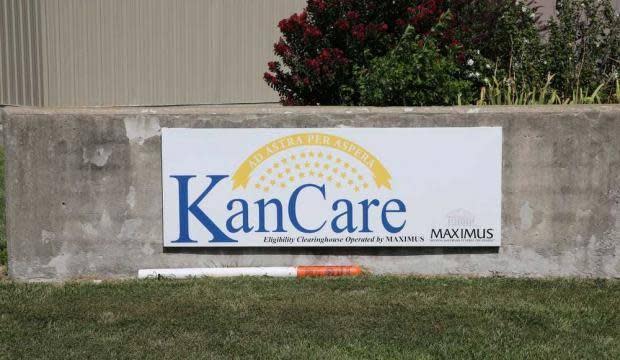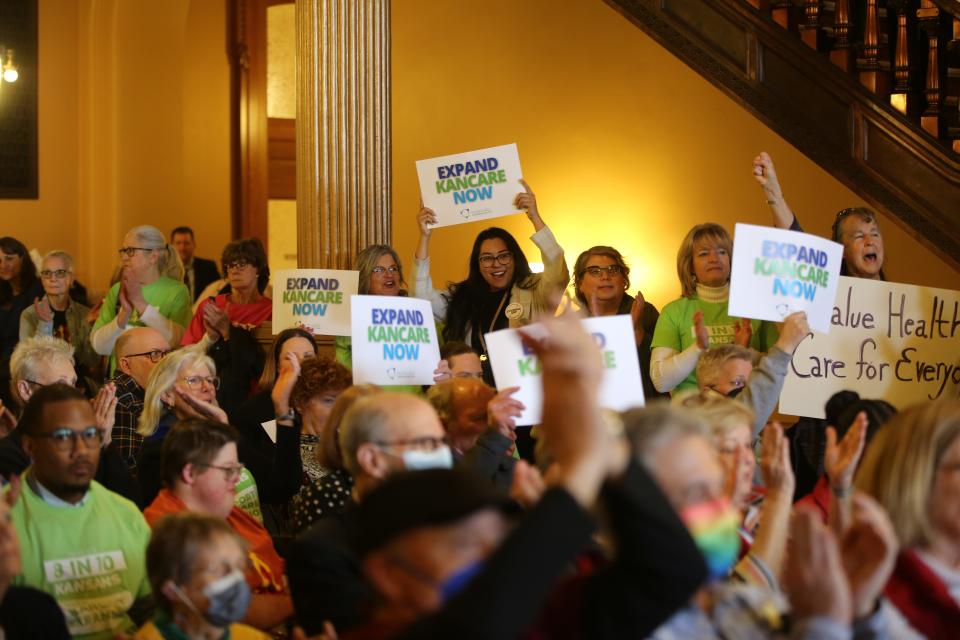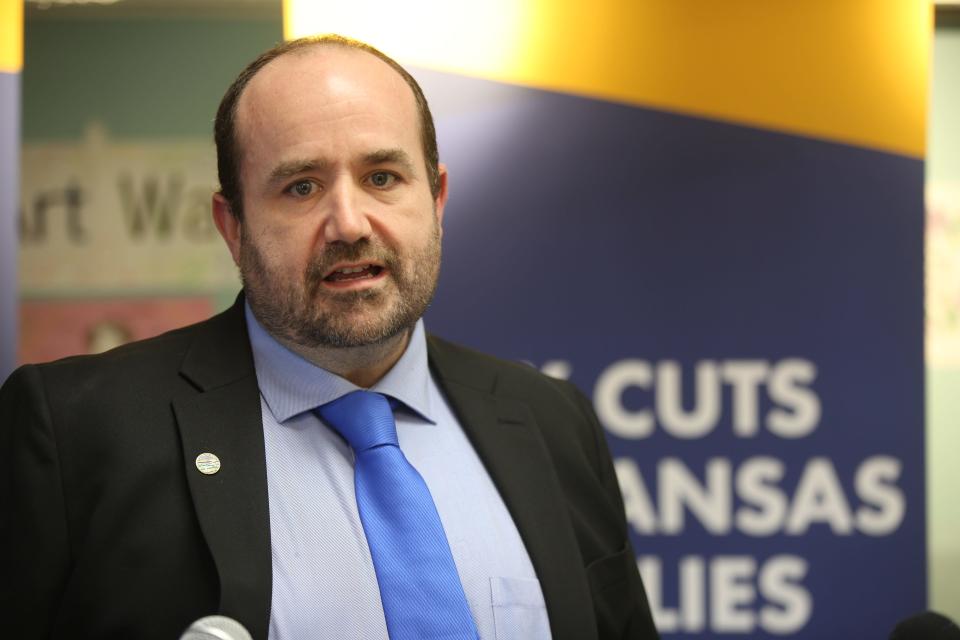As COVID-19 Medicaid flexibilities end, advocates worry Kansas could be doing more
Kansas is prepared to continue removing individuals from its Medicaid rolls, despite a brief pause amid complications in the state's efforts to wind down COVID-19-era protections for individuals enrolled in the government health insurance program.
Indeed, advocates believe Kansas still has a way to go in ensuring it is protecting health care access for as many low-income residents as possible.
This is an issue because the nation's COVID-19 public health emergency ended earlier this year, meaning that Kansas and its counterparts across the country must begin determining who is eligible for Medicaid after not doing so during the pandemic.
Kansas has opted to take advantage of some options offered by the Centers for Medicare and Medicaid Services, which has scrambled to urge states to make the process more efficient and prevent individuals from losing care.

But there is a feeling that more could be done.
The state's own data shows children are most likely to lose health insurance, even as evidence suggests many of them would still qualify for coverage if they had applied for renewal.
And the bulk of those who have been disenrolled to date have simply not returned the needed paperwork, something called a procedural disenrollment. This caused the state to briefly halt disenrollments for some Kansans.
Now that process has picked back up. And while Molly Gotobed, program director at the Community Health Council of Wyandotte County, said things have improved, questions remain about what the state can do to make things easier on those who rely on Medicaid.
"It sounds to me like they weren't prepared," she said. "And as a person who works with folks in the Medicaid community, we knew this was going to happen and that it was going to be this crazy."
Kansas to resume disenrollments after brief pause
Kansas' decision to pause some disenrollments for 30 days was cheered by advocates, who have raised fears almost from the beginning that residents will lose their KanCare coverage because they didn't return — or in some cases didn't receive — the right form.
In April, 45,806 individuals were terminated due to procedural reasons; a month later, that figure dropped to 14 and rose only slightly to 17 in June.

But KDHE spokesperson Phillip Harris said Thursday that individuals would start to lose coverage at the end of the month if they didn't return the needed paperwork. KDHE has stressed that individuals will have a 90-day window where they can return their renewal materials and, if found eligible, can have their coverage backdated.
This means that if a person whose renewal date was in June, they can return that paperwork before the end of August and, potentially, keep their coverage — though they will be without coverage while they remain in what is known as the 90-day window.
The high number of individuals losing coverage is not just an issue in Kansas but has been a persistent problem across the country.
Because of this, the federal government has tried to help states make the renewal process more efficient and increase the chances that people will be able to stay on Medicaid.
In Kansas, Harris said the state was using some of those options, such as allowing the private companies that actually administer Medicaid services in Kansas to take a greater role in helping individuals fill out the renewal documents.
KanCare could do more to automate renewal process, experts say
But there is concern the state is not maximizing its efforts to keep individuals on the Medicaid rolls.
Parents, for instance, might think they are no longer eligible and decline to return the renewal documents, despite the fact that their children may well still qualify for KanCare.
Projections from the state released earlier this year showed that as many as 125,000 individuals may ultimately lose coverage, including thousands of children.
These fears appear to have been born out. Data released by KDHE showed that nearly two-thirds of all individuals that were procedurally disenrolled in April and May were children between the ages of 0 and 18.
Compared with other states, Kansas has had a persistently low rate of individuals who are able to renew their coverage automatically, based on information the state already has about a person, such as their income or eligibility status for another program, such as food assistance.
In June, for instance, the rate of individuals who were renewed this way, called an ex parte renewal, was 3.8%. When the number of individuals who renewed using a pre-filled renewal form are included, the rate increases to 8.5%.
Both figures would give Kansas one of the lowest ex parte renewal rates in the country.
"I think there is a lot of improvement that could be made in those ex parte rates," said Tricia Brooks, a research professor at the Georgetown University McCourt School of Public Policy's Center for Children and Families.
Some of these issues, particularly with ex parte renewals, are not new because of the unwinding rush, said David Jordan, president and CEO of the United Methodist Health Ministry Fund.
"I think there's a real need to improve the process overall, and we're seeing those kinks because we haven't done it for three years," Jordan said. "Some of these challenges or policies or procedures were problematic before the pandemic."

Kansas does automatically renew individuals who the state knows have an income of $0. But the state opted against doing the same for those who are on food stamps or participate in the Temporary Assistance for Needy Families program.
There are 23 states that automatically use SNAP data for at least some Medicaid renewals, which an additional six do the same with TANF.
KDHE officials said they did consider adding that flexibility but that TANF, SNAP and Medicaid have different rules, meaning "there would be a cost and additional system changes associated with this flexibility."
Harris did note that the state was examining whether it would be possible to allow individuals whose only source of income was Social Security or a fixed pension to be renewed without having to check other data sources.
Experts say automatically renewing individuals who are clearly eligible for KanCare can both ensure people don't lose coverage and reduces the stress on the state's call center and staff who must make the determination decisions.
"I'm hesitant to judge a state for not taking any particular waiver because that might not kind of meet their needs," said Jennifer Wagner, director of Medicaid Eligibility and Enrollment for the think tank Center for Budget and Policy Priorities. "But if their ex parte rates are quite low and they're not taking advantage of every possible strategy to increase, that really seems like a missed opportunity."
Kansas communities of color most impacted by KanCare unwinding
The Kansas counties most impacted by the unwinding process appear to be those with large communities of color. Seward County had the highest per capita procedural disenrollment rate in the state for April and May, with Ford, Finney and Grant counties, which all have large Hispanic populations, not far behind.
Wyandotte County, which is among the most diverse in the state, also ranks high in the number of per capita procedural disenrollments, something that would not be a surprise to Community Health Council's Gotobed, who has spent significant time working with KDHE and her patients in an effort to ensure they can retain coverage.
One boy, for instance, was badly in need of insulin but had his coverage dropped, setting up a scramble to get ahold of the state and ensure it could be reinstated.
"We have had folks who were undergoing pretty serious treatments who had their coverage dropped and then we had to work with the state to get it reinstated quickly," she said.
But this only worked because the child's renewal materials had already reached the state. Thousands of others have not been so lucky — Gotobed said if the state doesn't have the required documentation, there are few options.
Kansans are able to renew over the phone or online, in addition to returning the materials mailed to them.
But this is not widely known, experts say, and the process can be cumbersome. A telephonic renewal requires an appointment, which can only be made by first calling the state's KanCare Clearinghouse at 1-800-792-4884. Online renewals are only available if a person has created an account.
After early struggles, the state's phone lines have been able to more quickly handle callers and individuals are less likely to hang up when they're on the line. But even the average answering time of 14 minutes can be too much if a person is on their break at work or waiting for their bus.
Brooks, of the Georgetown Center for Children and Families, said she even called Kansas' clearinghouse to test its usability and found it lacking in some key areas, such as an inability to leave a callback number. She also noted the requirement that a person provide their Social Security number upfront can frustrate if someone doesn't have that information handy.
"I think there's more that we can do to make the call centers effective and efficient," she said. "We see this across states. This is not a problem that is unique to Kansas. But I think more can be done there to really make sure that there's an easy way to get in quickly to get access."
Still, as disenrollments resume, there is an acknowledgment that more individuals might be wandering into their local pharmacy or doctor's office, only to find that their Medicaid coverage has lapsed.
"It just seems like the pause should continue until all the kinks are worked out," said Jordan, of the United Methodist Health Ministry Fund.
This article originally appeared on Topeka Capital-Journal: Kansas could do more in Medicaid unwinding, KanCare advocates argue

